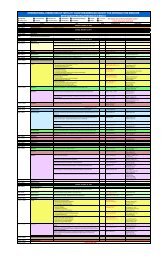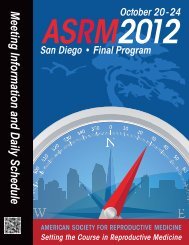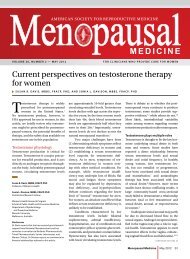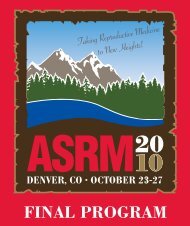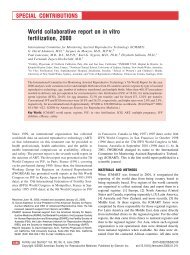scientific program • symposia - American Society for Reproductive ...
scientific program • symposia - American Society for Reproductive ...
scientific program • symposia - American Society for Reproductive ...
You also want an ePaper? Increase the reach of your titles
YUMPU automatically turns print PDFs into web optimized ePapers that Google loves.
ETHICAL DILEMMAS<br />
Presented by the Nurses’ Professional Group<br />
Margaret Swain, R.N.,J.D. (Chair)<br />
Private Practice<br />
Lori Whalen, R.N.<br />
Huntington <strong>Reproductive</strong> Center Fertility<br />
Adrienne J. Kramer, R.N.<br />
Boston IVF<br />
SCIENTIFIC PROGRAM <strong>•</strong> SYMPOSIA<br />
Wednesday, October 19, 2011 11:15 am – 1:00 pm<br />
Symposium<br />
Room 224 C/D<br />
Needs Assessment and Description<br />
Problematic and complex ethics issues present a particular<br />
challenge to care providers in assisted reproductive<br />
technology (ART). This session will guide the attendee<br />
through an ethics-based analysis of clinical situations. The<br />
presentation will focus on the process and application<br />
of medical ethics, with an emphasis on ART. Participants<br />
will learn value-driven approaches to situational ethical<br />
dilemmas, will identify pertinent resources and guidelines,<br />
and will develop an ethics-sensitive perspective. The most<br />
recent ASRM Needs Assessment Survey indicated an interest<br />
in this area among the membership.<br />
LAST CHANCE KIDS: KIDS DEALING WITH PARENTAL AGING<br />
AND DEATH<br />
Presented by the Mental Health Professional Group<br />
Julianne Zweifel, Ph.D. (Chair)<br />
University of Wisconsin School of Medicine and Public Health<br />
Linda A. Applegarth, Ed.D.<br />
The Perelman/Cohen Center <strong>for</strong> <strong>Reproductive</strong> Medicine<br />
Sharon N. Covington M.S.W., L.C.S.W.C<br />
Shady Grove Fertility <strong>Reproductive</strong> Science Center<br />
Needs Assessment and Description<br />
For good or bad, the advancements in assisted<br />
reproductive technology (ART) have had the consequence<br />
of significantly extending the “family-building years of one’s<br />
life” such that individuals can now become parents much<br />
later in life. Practitioners have become diligent about<br />
assessing and attending to the medical risks of pregnancy<br />
at an advanced reproductive age, but little attention<br />
has been paid to the practical, social and psychological<br />
consequences experienced by the resulting children. This<br />
symposium will examine the short-term and long-term<br />
impact on children who experience ailing and dying<br />
parents, as well as the impact of spousal death on the<br />
remaining parent.<br />
77<br />
Learning Objectives<br />
At the conclusion of this session, participants should be able<br />
to:<br />
1. Identify the constructs of an ethics-based approach to<br />
clinical situations.<br />
2. Recognize and apply the ethics framework to commonly<br />
encountered ART issues.<br />
3. Describe solutions <strong>for</strong> ethically problematic clinical<br />
scenarios.<br />
ACGME COMPETENCY<br />
Interpersonal and Communication Skills<br />
TEST QUESTION:<br />
After participating in this session, I will do the following in my<br />
practice:<br />
A. Maintain no policies and procedures to address ethically<br />
problematic issues.<br />
B. Consult the ASRM Guidelines and Ethics Committee<br />
reports and position papers when I have a question<br />
about a potentially ethically challenging situation.<br />
C. Not apply age-limit guidelines to IVF or donor-gamete<br />
patients.<br />
D. Not applicable to my area of practice.<br />
Wednesday, October 19, 2011 11:15 am – 1:00 pm<br />
Symposium<br />
Room 224 G/H<br />
Learning Objectives<br />
At the conclusion of this session, participants should be able<br />
to:<br />
1. Discuss the psychological and social impact of having<br />
parents who look and behave differently than peers’<br />
parents.<br />
2. Explain how children are impacted by caring <strong>for</strong> ill or<br />
aging parents.<br />
3. Describe how psychological development is impacted<br />
after a parent’s death.<br />
4. Identify ways that parents can proactively protect their<br />
children from undue burdens should the parent become<br />
seriously ill or die.<br />
5. Identify ways in which professionals can assist children<br />
who may face challenges associated with ill or aging<br />
parents.<br />
ACGME COMPETENCY<br />
Interpersonal and Communication Skills<br />
TEST QUESTION:<br />
The 1948 United Nations Universal Declaration of Human<br />
Rights declared in article 16 states that “men and women<br />
of full age, without limits due to race, nationality or religion,<br />
have the right to found a family.” This document asserts<br />
which one of the following:<br />
A. The right of the individual to reproduce.<br />
B. The right of the individual to not be coerced with respect<br />
to reproductive choices.<br />
C. It is the duty of the state or government to supply access<br />
to reproductive technologies.




